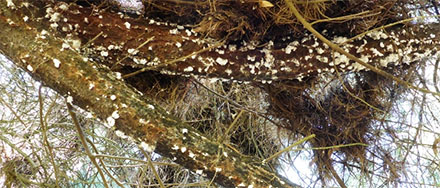Research in Australia and Europe is moving closer to identifying an effective solution to the damage to forests caused by giant pine scale (GPS). The research project aims to boost our understanding of the effectiveness of the various available biological control strategies. Source: Timberbiz
GPS poses a particular threat to Pinus radiata, a species that makes up 75% of Australia’s $1.16 billion softwood plantation estate but also infests other softwood conifers such as spruce, cedar and fir.
GPS is native to Greece and Turkey and was first detected in Australia in 2014. Following its initial establishment in urban and peri-urban Melbourne, it has been determined to be non-eradicable.
Greg Lefoe of Agriculture Victoria Research (AVR), which is leading the project, said GPS poses a major economic threat to the softwood timber industry.
“GPS is difficult and costly to control with insecticides, therefore biological control is considered a priority,” Mr Lefoe said.
“Successful biological control programs have a high return on investment for government and industry because, once established, biocontrol agents will continue to control the pest year on year.”
Biological control is also considered to be an environmentally friendly approach to pest mitigation.
AVR is conducting the research with the support of local industry partners including FWPA and various forest growers, as well as researchers in Greece, Switzerland and New Zealand. The project has already identified the predator Neoleucopis kartliana as the most promising biocontrol agent in the pest’s native Greece.
Subsequent native range and molecular studies conducted by the research team found that N.kartliana is actually made up of three predatory species, two of which were previously undescribed.
One of these species, designated Neoleucopis sp. B, was subjected to preliminary testing against native Australian scale insects. The results to date show the new species to be highly prey-specific, and therefore likely to be suitable for introduction into Australia.
Based on these results, an application for the release of Neoleucopis sp. B is being prepared by the team. Further research is needed to determine its suitability for long-term, sustainable management of GPS in Australia.
“Neoleucopis sp. B has proven its potential as an important GPS predator, and we have found no evidence of off-target attacks that might pose a threat to other insect species,” Lefoe said.
The team has worked to demonstrate this proposed biocontrol agent will not threaten Australian agriculture or biodiversity. A main area of focus has been on exposing Neoleucopis sp. B to a range of native scale insects through lab experiments.
“A major challenge of this research project has been the limited knowledge of Australian native scale insects that could be at risk from an introduced biocontrol agent,” Mr Lefoe said.
“To address this knowledge gap, we partnered with a native scale specialist at the University of Queensland. During this research, the distribution, biology, ecology and phylogeny of native Australian scale insects was studied, leading to vastly improved knowledge of this group of native invertebrates.”
The scientists believe the three Neoleucopis species may work together to target GPS, meaning the introduction of all three species could offer full season control under a range of climatic conditions. Again, further research is required to confirm this to be the case.
FWPA recently extended this project through to early-2025 to allow for further field and lab studies of the three Neoleucopis species in Greece, and to re-import one of the species into Australian quarantine for further testing.






